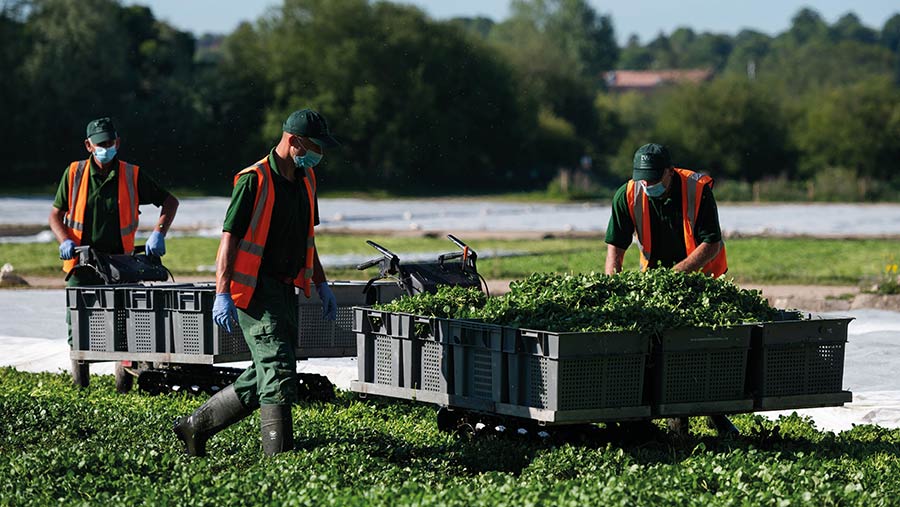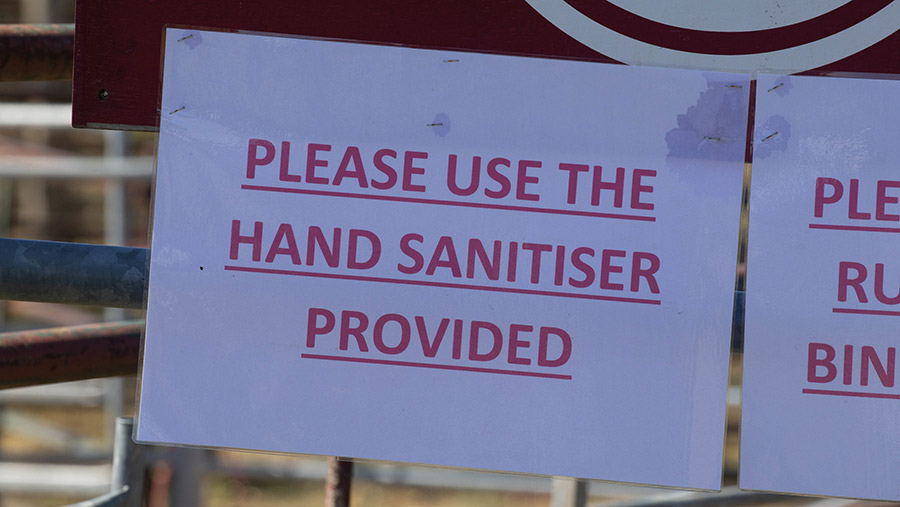Covid-19 Q&A: Practical farming queries answered
 © Jordan Pettitt/Solent News/Shutterstock
© Jordan Pettitt/Solent News/Shutterstock With Covid-19 cases at high levels in all areas, farmers should make sure they are following the correct protocols to keep themselves, their families and their staff safe.
It is crucial that they also have a plan in place to ensure necessary jobs – such as tending livestock – continue to get done should they contract the virus, especially for lone workers or small family farms.
At the time of writing, all four nations in the UK are under lockdown but it is important to be aware of how any tiered systems in the future will change the rules and guidance.
See also: Coronavirus: Farms advised to use face masks
Natalie Ward, senior associate, and Laura Knight, solicitor, from Thrings, have answered some of farmers’ most frequently asked questions.
Can my staff carry on as normal, as we’re key workers?
Given the current national lockdown, employers should consult with their employees to determine who does or does not need to come into the workplace. Depending on the workplace and role, it may be possible for some people to not come into the workplace.
Extra consideration should be given to those people at higher risk.
When employers consider that workers should come into their place of work, this will need to be reflected in the Covid-19 workplace risk assessment and actions taken to manage the risks of transmission, in line with government guidance.
Our farmworkers usually come into the house for lunch but we no longer feel comfortable with this. What should we do?
Current government guidance states that individuals should not go inside the homes of people outside their household or support bubble, unless it is a requirement of their job.
You may wish to consider asking employees to bring their own lunch, which can be consumed away from others.
Should the lunch be provided as part of the terms of employment – unusual – you will need to make sure you have Covid-19 secure measures in place such as a handwashing station and possibly wearing masks indoors.
When on a break, individuals should follow social distancing rules and maintain a 2m distance.
What about shared toilet facilities?
Any equipment or facilities used by employees during the day should be regularly cleaned and disinfected. We recommend placing handwashing guidance throughout such areas as reminders to your employees.
Multiple workers use the same machinery on our farm. Should I refuse if I feel uncomfortable?
Employees must clean equipment after use and wash their hands regularly. Consider reducing the number of staff using the same equipment in order to reduce the risk of cross-contamination.
If an employee feels uncomfortable, they should be encouraged to discuss their concerns so the team can work through possible solutions and make any reasonable adjustments.
If an employee refuses to work due to Covid-19 concerns, you may wish to consider placing them on furlough or sending them home and having temporary staff undertake their role.
If you send the employee home, you will still need to pay them their full salary.
If two workers are travelling somewhere together, should they take separate vehicles?
Under current government guidance, car sharing is not permitted with someone from outside your household or support bubble unless your journey is undertaken for an exempt reason (for example, car sharing is reasonably necessary as part of your work).
Where it is necessary, employees should keep their distance – as much as is possible – and wear masks.
What about people working in close proximity, such as during workshop tasks?
Where social distancing cannot be followed, businesses should consider whether that activity can be redesigned to maintain a 2m distance, or 1m distance with risk mitigations.
Risk mitigations include:
- Increasing the frequency of handwashing and surface cleaning
- Keeping the activity time as short as possible
- Using screens or barriers to separate people
- Using back-to-back or side-to-side working (rather than face-to-face)
- Reducing the number of people each person has contact with by using fixed teams or partnering
- Wearing face masks
- Keeping doors and/or windows open.
What should I do if I’m concerned my staff aren’t following correct lockdown or social distancing rules outside of work?
Reiterate to staff that they must comply with government guidelines. Should an employee continue to ignore guidelines, you can consider pursuing disciplinary procedures as you have health and safety duties to your employees.
There are no “employer’s rights” in relation to ensuring staff observe guidelines. If police believe an individual has broken self-isolation rules, they may issue them with a fixed penalty notice – ranging from £1,000 for a first offence to £10,000 for repeated offences.

© Tim Scrivener
Can I have extra help come on farm during lockdown to help with lambing/calving?
Where additional workers are necessary due to increased workload, it is permissible to bring in new staff as they will be classed as essential workers.
You should consider whether all additional staff are absolutely essential and cut down where you can.
If that’s not possible, then reiterate the importance of social distancing and washing hands and equipment.
If practicable, you can place new workers together in groups in order to reduce how many employees come into contact with each other on a daily basis.
What should I do if my entire workforce contract the virus and are unable to work?
It may be worth having a back-up plan in place ahead of such an event occurring. This should include details about what essential work is needed, how many employees are required to carry out this work, and whether temporary staff could be brought in to fulfil this.
This plan can be communicated to staff while also making sure they are aware of general guidance and procedures regarding social distancing and safe working practices.
See also: Helpline offers practical advice to farmers ill with Covid-19
If I test positive for Covid-19, can I have someone come on to the farm to help as long as I don’t have any contact with them?
You should make a plan for the care of your livestock in case you need to self-isolate, especially if you are a sole worker.
Government guidance states that you must not leave your home when self-isolating, including not going to work.
If you’re self-isolating, you should make alternative arrangements to take care of your animals’ welfare.
If you’re unable to care for your livestock – either because you’re unwell or the animals are not kept at your home – you should arrange for someone else who is not self-isolating to care for them.
If this is not possible, you should contact your vet or local authority.
Notify anyone caring for your animals on your behalf in advance that you’re self-isolating and arrange a no-contact service where possible.
If I suspect one of my staff members may be ill with the virus, can I make them have a test? Am I entitled to see the result of any test?
If you have a genuine concern that an employee may have Covid-19 and they have either refused to get a test or won’t show you the results, you can send them home on full pay.
It is unlikely you could force an employee to take a test. One option would be to send them home on full pay for at least the amount of time they would be required to self-isolate if they tested positive.
It is important to consider your health and safety duty to your other employees. Under current government guidance, anyone who receives a positive Covid-19 test should self-isolate – a failure to comply with the self-isolation rules will result in a fine.
Talking to your employees in advance about what arrangements you would make while they went to get tested, should that become necessary, might help allay any fears or reluctance around testing.
Help and advice
Rural charities are on hand for support and advice, including Farming Help, which has been set up specifically for Covid-19 matters.
Call 03000 111 999 (or 0300 111 4166 in Scotland) between 7am and 11pm every day of the year to access free advice and local support.
Get in touch if you:
- Feel concerned or anxious and would like to talk to someone who understands farming, will listen to you and help you think through your options
- Would like help to draft a contingency plan to ensure you and your farm are prepared, should you be unable to work for a time
- Need to find help locally, should you or people you rely on become ill or are self-isolating.
Your questions
Have you got any queries we haven’t addressed in this article? Get in touch with Farmers Weekly by emailing business reporter lauren.harris@markallengroup.com or messaging our social media accounts.
